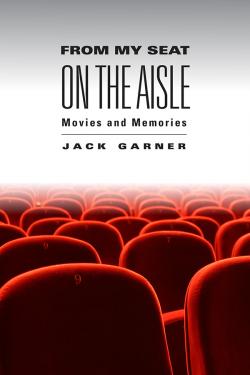Jack Garner was a chief national film critic for the hundred or so newspapers and outlets of Gannett Company for twenty years, and was the film critic of the Rochester Democrat & Chronicle for thirty years. I met Mr. Garner and knew him slightly when I was living in Rochester, New York, at a film festival we both covered many years ago. He has been an inspiration and model for how film criticism should be approached, and this book is also a fine and enjoyable synopsis of his long and rewarding career.
In a film critic, you want a reviewer who, above all, has good taste, intelligence, and a fine sensitivity. Mr. Garner has all three in spades. He set the bar very high for film criticism, and was, and still is, a role model for writing about cinema and all things related.
Mr. Garner discusses in his book such things as his basic concepts of film reviewing. “First, I tried to give every film a fair shake.” “Second, I think of myself as a shades of grey critic.” Every film has some redeeming quality, he writes, and most films are neither perfect nor completely dismal. “Third, I try not to give too much away.” Plot spoilers are the bane of a film reviewer’s existence. “Finally, I hate numbers or stars” or other such rating system.
Later on in the book, Mr. Garner discusses what is a critic? To sum up, he feels that a critic is both a journalist and historian, an advocate both for the consumer and for the arts. Simply put, a critic is someone who expresses opinions about the quality of a work, and backs up those opinions with examples and justifications.
A critic must address two basic questions, he writes. What is the artist trying to do, and how well he or she succeeds. The film should be considered in light of the quality of the acting, the execution and originality of ideas, and its form and technique.
But the most important element of any movie is “a film must have life” -- it must move you and stir emotional reactions in the viewer. “A good film demands a reaction.” I couldn’t agree more.
His book also includes such gems as favorite reviews he’s done over the years, lists of his favorite all time movies and actors and why, his memorable encounters with such icons as Woody Allen, Sophia Loren, Ray Charles, James Stewart, and many others, and his iconic and important essays on the art of cinema.
Intelligently organized, and a very pleasant read, this excellent book sets the standard for film criticism, and should be considered an essential part of any film lover’s library.
In a film critic, you want a reviewer who, above all, has good taste, intelligence, and a fine sensitivity. Mr. Garner has all three in spades. He set the bar very high for film criticism, and was, and still is, a role model for writing about cinema and all things related.
Mr. Garner discusses in his book such things as his basic concepts of film reviewing. “First, I tried to give every film a fair shake.” “Second, I think of myself as a shades of grey critic.” Every film has some redeeming quality, he writes, and most films are neither perfect nor completely dismal. “Third, I try not to give too much away.” Plot spoilers are the bane of a film reviewer’s existence. “Finally, I hate numbers or stars” or other such rating system.
Later on in the book, Mr. Garner discusses what is a critic? To sum up, he feels that a critic is both a journalist and historian, an advocate both for the consumer and for the arts. Simply put, a critic is someone who expresses opinions about the quality of a work, and backs up those opinions with examples and justifications.
A critic must address two basic questions, he writes. What is the artist trying to do, and how well he or she succeeds. The film should be considered in light of the quality of the acting, the execution and originality of ideas, and its form and technique.
But the most important element of any movie is “a film must have life” -- it must move you and stir emotional reactions in the viewer. “A good film demands a reaction.” I couldn’t agree more.
His book also includes such gems as favorite reviews he’s done over the years, lists of his favorite all time movies and actors and why, his memorable encounters with such icons as Woody Allen, Sophia Loren, Ray Charles, James Stewart, and many others, and his iconic and important essays on the art of cinema.
Intelligently organized, and a very pleasant read, this excellent book sets the standard for film criticism, and should be considered an essential part of any film lover’s library.
